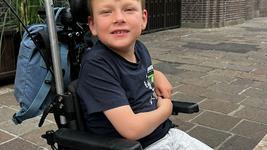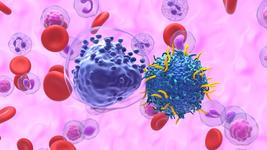Allogene Therapeutics' ALLO-316 Shows Durable Responses in Advanced Renal Cell Carcinoma
CMN Intelligence - The World’s Most Comprehensive Intelligence Platform for CRISPR-Genomic Medicine and Gene-Editing Clinical Development
Providing market intelligence, data infrastructure, analytics, and reporting services for the global gene-editing sector. Read more...
On Sunday, Allogene Therapeutics presented new clinical data from the Phase 1 TRAVERSE trial, which is evaluating the allogeneic CAR-T cell therapeutic candidate ALLO-316 for the treatment of advanced or metastatic renal cell carcinoma (RCC).
The data, presented orally at the 2025 Annual ASCO meeting held in Chicago, highlights durable responses in heavily pre-treated patients after a single dose of ALLO-316.
A CD70-targeting CAR therapy for multiple cancer indications
Allogene Therapeutics is developing ALLO-316 to treat RCC as well as several blood cancers that express the cell-surface antigen CD70. The expression of CD70 is limited in healthy tissues, which makes it an attractive anti-tumour target.
ALLO-316 is generated from healthy donor T cells that are lentivirally-transduced in vitro to express a CD70-targeting chimeric antigen receptor (CAR). Cellectis’ TALEN® gene-editing technology is used under licence to further develop ALLO-316 with several gene edits. The T cell receptor (TCR) locus, TRAC, is disrupted in the donor-derived cells to eliminate the risk of graft vs host disease. The CD52-encoding gene is also disrupted in ALLO-316. This is a common feature in allogeneic CAR-T cell therapies, in which an anti-CD52 antibody is administered prior to CAR-T cell therapy to suppress the patient’s immune system and to allow the CAR-T cells to stay engrafted for full therapeutic effect. CD52 disruption renders the CAR-T cells resistant to this treatment.
TRAVERSE is a dose-escalation Phase 1 trial that is recruiting up to 120 adult patients with advanced or metastatic RCC who have progressed on standard therapies that include an immune checkpoint inhibitor and a VEGF-targeting therapy. Each patient will receive a single dose of intravenously-administered ALLO-316 after a lymphodepletion regimen comprising fludarabine, cyclophosphamide, and Allogene’s CD52 monoclonal antibody, ALLO-647.
Renal Cell Carcinoma
Renal cell carcinoma (RCC) occurs most often in males ages 60 to 70 years old, and comprises several disease subtypes, with symptoms including but not limited to passing blood in urine, abdominal pain and abdominal mass, high blood pressure, anaemia, and fever. Some individuals remain symptom-free.
RCC is usually diagnosed via CT scaning or sonography. Early diagnosis and disease staging is critical to initate appropriate treatment as early as possible. The exact cause of RCC is unknown although smoking and certain pre-existing kidney diseases are among the established risk factors. Patient prognosis varies greatly depending on many factors including age and stage of disease upon diagnosis. Treatment depends on type and stage of disease, and typically involves a combination of surgical removal of tumours, hormone treatment to shrink tumours, and chemo- and immunotherapy.
Source: www.rarediseases.org
A single dose of ALLO-316 demonstrates efficacy and manageable safety profile
The data presented at ASCO focused on the Phase 1b expansion cohort from the TRAVERSE study in which patients were treated with a standard immunosuppressive regimen of cyclophosphamide and fludarabine followed by a single dose of 80 million AlloCAR T™ cells.
All 22 patients in this cohort had tumours that were resistant to immune checkpoint blockers and at least one tyrosine kinase inhibitor. Sixteen of the ALLO-316-treated patients had a high CD70 Tumor Proportion Score (TPS >50%), meaning that more than half of the cells sampled from the tumour expressed CD70. Patients were monitored for safety and efficacy of ALLO-316 and the median time from enrolment to the dosing with ALLO-316 was four days.
A single dose of ALLO-316 stabilised or reversed disease progression in the majority of patients. A Confirmed Overall Response Rate (ORR) of 31% was observed in the 16 patients with high tumoral expression of CD70, with 44% achieving a minimum of 30% reduction in tumour size. Of the five confirmed responders, four maintain ongoing responses and one is in sustained remission for over 12 months. According to the press release, the median duration of response has not yet been reached, indicating the potential for long-term disease control.
The clinical data indicates a manageable safety profile for ALLO-316 that is consistent with lymphodepletion and an active CAR T product. The most frequent Grade ≥3 events were haematologic and no treatment-related Grade 5 events were reported. The most common all-grade adverse events were cytokine release syndrome, neutropenia, decreased white blood cell count, anaemia and thrombocytopaenia. The clinical data also continue to support the potential of Allogene's DAGGER technology to increase persistence of AlloCAR T cells, with demonstrated suppression of host T cells and robust expansion, persistence and tumour infiltration of ALLO-316.
The only allogeneic CAR-T candidate to show promise in treating solid tumours
Clinical data from the TRAVERSE trial announced in November 2024 demonstrated an ORR of 50% and confirmed response rate of 33% in patients with CD70 TPS above 50 %, following a single intravenous dose of ALLO-316. As of yet, ALLO-316 is the only allogeneic CAR-T therapeutic candidate to show promise in treating solid tumours. In October 2024, the FDA granted Regenerative Medicine Advanced Therapy designation based on the potential of ALLO-316 to address the unmet need for patients with advanced or metastatic RCC. Prior to that, the FDA granted Fast Track Designation to ALLO-316 in March 2023.
Commenting on the latest data, Samer A. Srour, MB ChB, MS, Associate Professor of Stem Cell Transplantation and Cellular Therapy at The University of Texas MD Anderson Cancer Center and lead investigator of the TRAVERSE trial said:
»Patients diagnosed with advanced or metastatic renal cell carcinoma often face a median survival in months after exhausting standard therapies. These updated results from a larger cohort of patients with confirmed CD70-positive tumours provide compelling evidence that treatment with ALLO-316 can reduce tumour burden, control disease, and in some cases deliver durable responses. These findings underscore the clinical promise of an allogeneic CAR T to address the significant unmet needs in solid tumours and offer hope to patients who have exhausted other options.«
See the official press release for further details.
Stay tuned for more updates
We will continue to update you ALLO-316 and the TRAVERSE trial as new details emerge. In the meantime, you can find all of our coverage on clinical-stage gene editing programmes here.
For a complete overview of current gene editing clinical trials, check out CRISPR Medicine News' Clinical Trials Database.
To get more CRISPR Medicine News delivered to your inbox, sign up to the free weekly CMN Newsletter here.
Tags
ArticleNewsClinical News UpdatesRenal Cell CarcinomaAllogene Therapeutics, Inc.
CLINICAL TRIALS
Sponsors:
Base Therapeutics (Shanghai) Co., Ltd.
Sponsors:
Base Therapeutics (Shanghai) Co., Ltd.







